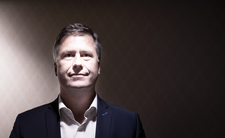An interview with SUSE CEO Nils Brauckmann
Open Collaboration

© Nils Brauckmann
Looking back at 25 years of Linux and SUSE and forward toward the brave new world of containers and the cloud.
SUSE is the oldest Linux company, and it is still going strong. Founded in 1992, just one year after Linus Torvalds announced the birth of Linux, SUSE has gone through many changes in recent years. In 2003, Novell purchased SUSE in a bold effort to ride with the rising tide of Linux. In 2011, the Attachmate Group bought Novell, reorganizing SUSE as an independent business unit. In 2014, Attachmate became part of Micro Focus.
Nils Brauckmann came to SUSE through the Attachmate acquisition, and some believe he is the leader the company always needed. Last year, he was promoted as the chief executive officer of SUSE within Micro Focus. SUSE has been investing heavily in increasing its work force, mostly with more engineers. In this interview, we reflect on the last 25 years of Linux and SUSE.
Swapnil Bhartiya: Linux is 25 years old. What do you think it has achieved in these 25 years? What do you think it has contributed to our society that's beyond software and code?
[...]
Buy this article as PDF
(incl. VAT)